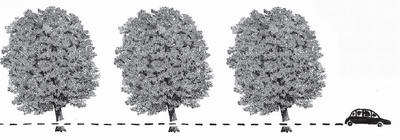 The obsession with the automobile has created a culture of anger. Those who drive exhibit anger at the planet - strip the resources and ozone layer from the earth, at the government - taxes, poor road quality, and road laws. They are also angry at people - charging at cyclists, yelling at other drives for all sorts of infractions including parking spaces. which has escalated to shooting and assault.
The obsession with the automobile has created a culture of anger. Those who drive exhibit anger at the planet - strip the resources and ozone layer from the earth, at the government - taxes, poor road quality, and road laws. They are also angry at people - charging at cyclists, yelling at other drives for all sorts of infractions including parking spaces. which has escalated to shooting and assault. I have traveled across Canada on bicycle (Nova Scotia, PEI, B.C and southwestern Ontario), and it is amazing how fellow cyclists are so happy and helpful. When one is riding by they say hello, wave if going in the opposite direction and will always stop if you are on the roadside in need of help. I have yet to encounter two cyclists in a yelling match over bicycle space.
Walking to work is also very healthy for the soul. One can hear birds; spot cats basking in the windows under the warm sun, and think about one's own universe and the one around them. Driving in a car does not promote this soulfulness.
What is it about the car that converts a person into a being of anger? It may be the need for instant gratification. Autos provide faster travel (faster than walking, public transit and bicycling) in theory. With so many on the roads today the reality has changed. Has the overcrowding of the roads caused the rise in aggravation to the point of violence?
I have heard that autos provide privacy. One does not have to live by the timetable of public transit. One can avoid being with others on a crowded bus or train. A driver can chose whatever route to get from a to b. But has not the isolation of the private auto promoted the disconnection of the individual from society? Has not this isolation meant that people are not longer willing to deal with fellow patrons and the earth in a patient and respectful manner?
Autos were created to grant us freedom to go wherever, whenever and transport items back to our homes. Autos have meant that families could live further away from the city center where the "good life" is more affordable. People can drive to their vacation destination and arrive sooner than traveling by train or bus. You can go camping with all your gear, tent and food. You could drive to the cottage every weekend with all your gear, alcohol and food. But are you free? Do you really have the freedom that a person who lives in the city center? Can you find everything you need within 15 minute walk or 10 minute bike ride (food, dining, movies, parks, work)? Can your body afford the freedom of lack of exercise as you get older?
Suburban living as afforded by the car has alienated people from their work (spending over one hour each way in traffic jams), from active living and from the earth that has given them a home.
It may be that the anger displayed by those who drive a private vehicle is coming from the alienation experienced from falling for a auto culture. The frustration of the disconnection can certainly lead to anger and who better to take it out on than those who get in the way - the reminders of this frustration.
2 comments:
I've driven a car in Scotland a few times and there is a different experience of communication with other drivers there. Half the time I was driving on single track roads which meant coming face to face with a car going in the opposite direction which means one of you has to pull over, even back up sometimes to a passing spot; the pass is always accompanieed with a wave. (In Toronto I hardly ever see inside cars.)
On dual track roads, a slow driver will signal to the side of the road and let you know it's safe to pass, and then even slow down to make the pass quicker. This is followed by a wave, or flick of the ceiling light at night. On the freeway, even, there is communication as drivers flash their headlights to give permission to move into the passing lane.
I wonder if the British, or maybe just the Scots, are less susceptible to this anger in the car.
I do not disagree with you that auto use creates anger. I do not know if the solutions that will reduce car use at that simple. Many people eat junk food and have never driven a car.
Many people have no desire to live in urban centres, regardless of how close they are to a grocery store.
I dunno.
Post a Comment